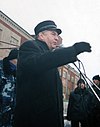2005 Moscow City Duma election
You can help expand this article with text translated from the corresponding article in Russian. (May 2023) Click [show] for important translation instructions.
|
This article needs additional citations for verification. (December 2023) |
| |||||||||||||||||||||||||||||||||||||||||||||||||||||||
| Turnout | 34.75% | ||||||||||||||||||||||||||||||||||||||||||||||||||||||
|---|---|---|---|---|---|---|---|---|---|---|---|---|---|---|---|---|---|---|---|---|---|---|---|---|---|---|---|---|---|---|---|---|---|---|---|---|---|---|---|---|---|---|---|---|---|---|---|---|---|---|---|---|---|---|---|
| |||||||||||||||||||||||||||||||||||||||||||||||||||||||
The Moscow legislative election of 2005 was held on 4 December of that year to the fourth convocation of the Moscow City Duma. On party lists via proportional representation were elected 18 of the 35 deputies, while 17 deputies were in single-member constituencies. To get into the City Duma via a party list, parties need to overcome the 10% threshold. The term of office of the new City Duma was four years.
Background[edit]
On 6 November 2005, Rodina was barred from taking part in the December elections to the Moscow Duma following a complaint filed by the Liberal Democratic Party of Russia that Rodina's advertising campaign incited racial hatred.[1] The advertisement in question showed Caucasian immigrants tossing watermelon rinds to the ground and ended with the slogan "Let's clear our city of trash", calling for Russians to clean their cities of rubbish.[1][2][3][4][5] It garnered much controversy and opinion polls predicted that Rodina would come second with close to 25% in the December vote. Rogozin appealed the decision, but the ban was upheld on 1 December 2005.[6][5]
Results[edit]
First place in the voting by party lists was United Russia, which received 47.25% of the vote (13 seats). The 10-percent barrier was overcome by two other parties, the Communist Party (16.75%, 4 seats) and United Democrats who participated in the elections under the banner of Yabloko (11.11%, 3 mandates).
Parties which did not pass 10% threshold:
- LDPR, 8%
- Russian Party of Life, 4.77%
- Green Party, 2.64%
- Free Russia, 2.2%
- Social Justice Party, 1.22%
- Narodnaya Volya, 0.6%.
United Russia also won all 15 single-member districts. Thus, the party won 28 seats out of 35 total. The list of United Russia party was headed by the mayor of Moscow, Yuri Luzhkov, who helped them to improve the results in Moscow compared to the 2003 Duma elections (in December 2003 United Russia received 34.43% of the vote).
 «Yabloko» |
|
References[edit]
- ^ a b Snyder, Timothy (20 March 2014). "Fascism, Russia, and Ukraine". The New York Review of Books. Retrieved 28 March 2021.
- ^ "Верховный суд снял партию Родина со всех ближайших региональных кампаний" [The Supreme Court has removed the Rodina Party from all the regional campaigns]. Oil and Gas Information Agency. 6 March 2006. Retrieved 19 March 2018.
- ^ Blomfield, Adrian (23 November 2005). "Racist ads spark row in Russia's far-Right". The Daily Telegraph. Retrieved 28 August 2016.
- ^ Parfitt, Tom (10 November 2005). "'Racist' Russian TV advert investigated". The Guardian. Retrieved 28 August 2016.
- ^ a b Родина-2005: Очистим Москву от мусора! [Rodina-2005: Clean Moscow of rubbish!]. politota.ru. Archived from the original on 2021-12-21. Retrieved 5 November 2018.
- ^ Babich, Dmitry (15 November 2005). "The Upheaval in France – an Inspiration for Russian Xenophobes?". Archived from the original on 5 May 2007.









